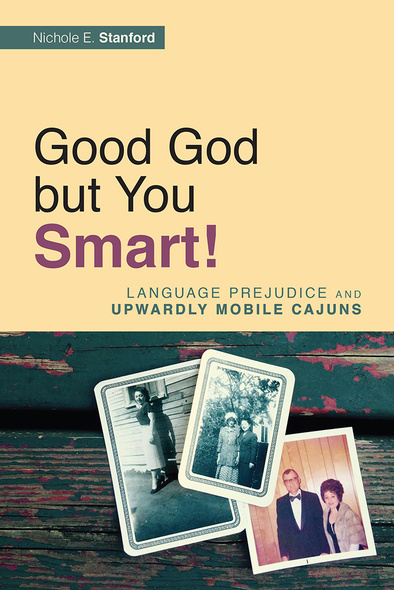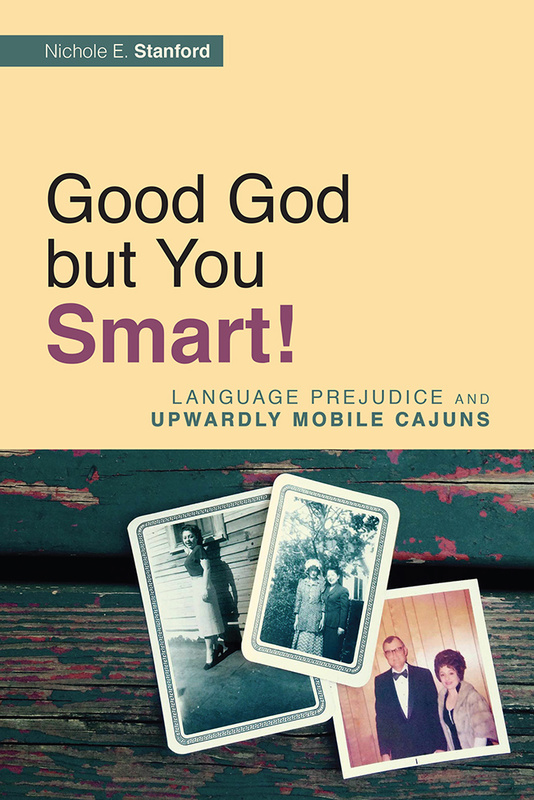Good God but You Smart!
Language Prejudice and Upwardly Mobile Cajuns
Utah State University Press
Taking Cajuns as a case study, Good God but You Smart! explores the subtle ways language bias is used in classrooms, within families, and in pop culture references to enforce systemic economic inequality. It is the first book in composition studies to examine comprehensively, and from an insider’s perspective, the cultural and linguistic assimilation of Cajuns in Louisiana.
The study investigates the complicated motivations and cultural concessions of upwardly mobile Cajuns who “choose” to self-censor—to speak Standardized English over the Cajun English that carries their cultural identity. Drawing on surveys of English teachers in four Louisiana colleges, previously unpublished archival data, and Pierre Bourdieu’s theory of the legitimate language, author Nichole Stanford explores how socioeconomic and political pressures rooted in language prejudice make code switching, or self-censoring in public, seem a responsible decision. Yet teaching students to skirt others’ prejudice toward certain dialects only puts off actually dealing with the prejudice. Focusing on what goes on outside classrooms, Stanford critiques code switching and cautions users of code meshing that pedagogical responses within the educational system are limited by the reproductive function of schools. Each theory section includes parallel memoir sections in the Cajun tradition of storytelling to open an experiential window to the study without technical language.
Through its explication of language legitimacy and its grounding in lived experience, Good God but You Smart! is an essential addition to the pedagogical canon of language minority studies like those of Villanueva, Gilyard, Smitherman, and Rose.
The study investigates the complicated motivations and cultural concessions of upwardly mobile Cajuns who “choose” to self-censor—to speak Standardized English over the Cajun English that carries their cultural identity. Drawing on surveys of English teachers in four Louisiana colleges, previously unpublished archival data, and Pierre Bourdieu’s theory of the legitimate language, author Nichole Stanford explores how socioeconomic and political pressures rooted in language prejudice make code switching, or self-censoring in public, seem a responsible decision. Yet teaching students to skirt others’ prejudice toward certain dialects only puts off actually dealing with the prejudice. Focusing on what goes on outside classrooms, Stanford critiques code switching and cautions users of code meshing that pedagogical responses within the educational system are limited by the reproductive function of schools. Each theory section includes parallel memoir sections in the Cajun tradition of storytelling to open an experiential window to the study without technical language.
Through its explication of language legitimacy and its grounding in lived experience, Good God but You Smart! is an essential addition to the pedagogical canon of language minority studies like those of Villanueva, Gilyard, Smitherman, and Rose.
'[A]n interesting, thoughtful, and highly readable study of language use in the Cajun community. It not only helped me understand a culture I didn’t know much about, but it also enabled me to reflect on the role I and all teachers play in sorting students into the American class system. It helped me see my students’ struggles in a new light. As educators work to enact linguistically empowering pedagogies, texts like Stanford’s remind us to keep the larger picture in mind—the system upheld not only by schools, but by families, communities, and other social networks. . . . its contribution to the academic conversation is significant, I believe its implications for the larger cultural conversation surrounding language can be even greater.'
—Composition Forum
Nichole E. Stanford is a writer in composition and rhetoric focusing on Cajun English, minority academics, and prevalent language myths in the United States for general audiences.





